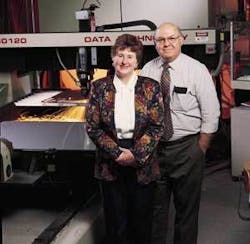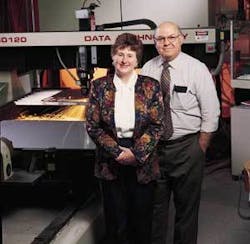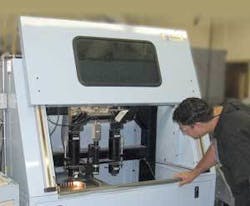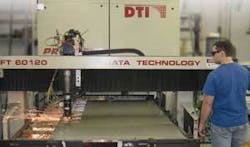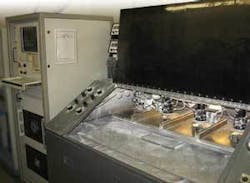Job shop weathers the “perfect storm”
An industry recession, off-shore outsourcing, and new competition test job shop’s mettle
Bruce Beauchesne
Laser Services Incorporated’s (LSI) goal when founded in 1979 was to provide broadly diversified materials processing job shop services to manufacturers. Two owners began operations in a leased 2500-square-foot facility in Billerica, Massachusetts, with three employees and two laser systems. Now housed in a 17,000-square-foot building, 34 personnel support CO2, pulsed Nd:YAG, and Q-switched Nd:YAG laser systems for drilling, cutting, welding, marking, and other related processing of ceramics, metals, plastics, silicon wafers, adhesive preforms, composites, rubber, and wood.
Several hundred customers include individuals, corporations, government agencies, and universities, mostly located within the United States and Canada although some are located in Taiwan, China, and Europe. Among the major industries served are aerospace, medical devices, microelectronics, pharmaceutical equipment, automotive, ordnance, environmental testing, woodworking, signage, and other industrial, military, and commercial sectors.
Changing times
Laser job shops have been a practical alternative for manufacturers since the late 1960s. During the early formative years, to use a worn phrase, lasers were referred to as a “solution looking for a problem.” Today, laser technology is a widely accepted and necessary manufacturing process, in some industry sectors the dominant technology. For example, it is a leading state-of-the-art element in automotive, jet engine, and microelectronic applications to note just a few.
With the emergence of the global economy, manufacturers, equipment suppliers, and job shops have to deal with just-in-time, ship-to-stock, lean manufacturing operations and stringent quality control requirements. The global economy also dramatically contributed to increased pressure on manufacturers to bring their products to market faster and cheaper.
The perfect storm
As the trend to manufacture products offshore expanded, large and small companies were racing to significantly enhance efficiency while, at the same time, downsizing operations. Fortunately, a robust economy provided a basis to facilitate such changes. Such were the conditions when the bubble burst and the “dot com” recession dealt a devastating blow to many businesses as orders dwindled and banks started pulling-in loans. The timing could not have been worse. The recession, combined with new pressures to remain competitive within the framework of the global economy, created a “perfect storm” in the U.S. manufacturing environment.
As the recession deepened, Laser Services found its order frequency and dollar volumes decreasing significantly. Ultimately and painfully, over a two-year period, the staff was reduced by half. Fortunately, the company had nurtured a relationship of mutual trust and respect with its bank which enabled them to take a supportive position during the recessionary period.
Skies clear
By 2003, LSI had weathered the storm along with most of its customers. Sales were growing once again. We found ourselves paying more attention to details that had received less scrutiny during more robust times. We also recognized we could operate in a much leaner mode than previously thought possible.
Management decided to apply a lean approach to all aspects of the job shop operations while, at the same time, placing emphasis on enhancing quality assurance, customer satisfaction, technology, and general operations.
The thrust of the program was to create a set of conditions that would enable the company to provide even better services to our customers while, at the same time, strengthening our competitiveness and profitability. It was assumed that a successful program would enhance the viability of our customers and us relative to being effective entities in the global economy. The approach taken was straight forward, simply based, in large part, on common sense.
Just prior to the recession, LSI had initiated a program to become ISO registered. The reasoning was that ISO had become a widely accepted quality organization and that we needed to participate because of the market sectors we served; aerospace, medical, and microelectronics. The certification process was somewhat slow and painful as we learned that humans have a tendency to be rather adverse to change. In time, the advantages of more properly defined procedures and documentation became evident and, with great relief, registration was achieved. We have gone on to become registered to AS-9100 (aerospace) as well. We believe we have achieved a world-class quality system.
With manufacturers’ profit margins being squeezed, their purchasing staffs find themselves busier. As a job shop services supplier, LSI has focused on various concepts in an attempt to provide relief for overburdened buyers. We have established working relationships with a broad array of other shops to provide services for general machining, sheet metal fabrication, E.D.M., plating, and numerous other capabilities. This arrangement enables buyers to cover their complex requirements quickly with a supplier they know they can rely on.
Once an order is in place, an advanced manufacturing resource program (MRP) system provides instant tracking regarding the exact status and location of the job. Shipments can now be traced right up to the point of delivery.
The technical and economic benefits of laser materials processing continue to provide meaningful solutions across a broad range of production issues. At LSI, an extended effort is made to learn the nuances of a customer’s manufacturing requirements, so that we can offer suggestions to lower costs, improve quality, or enhance producability. Interestingly, a common area for improvement is to assist in upgrading and standardizing blueprints.
Technology
When considering laser technology as a means to compete in the global market, and to assist our customers to do so, we find an array of available materials processing systems. Job shop owners have to make calculated decisions regarding equipment acquisition. Many of today’s laser system manufacturers, with decades of experience, provide systems that are highly reliable with low operating and maintenance costs. However, attempting to have all state-of-the art equipment can be very expensive. At LSI, we have found that a combining of older, time-tested systems and new systems provides the most cost-efficient approach. Having highly trained laser technicians on staff is a significant asset for efficient operations.
Operations
At LSI, operating in “lean mode” does not mean making imprudent cutbacks. Some of the elements and considerations that have contributed to enhance operations are:
• Cross training to provide better production flexibility and stability during vacation and sick time periods
• An advanced MRP system that ties the whole operations package together providing in-depth tools for management review and inventory control.
• Safety and health training is an essential element for a manufacturing operation and a requirement of ISO/AS-9100 operating procedures. Good practices help to keep employees on the job and to keep insurance costs from escalating
• Nimbleness is an attribute that many companies seem to find elusive. LSI believes it is critical for top managers to be appraised of significant operating conditions so that decisions can be made concisely and quickly.
Occasionally someone with a fast turn-around project will call asking if we can perform a certain laser process function. Often, we can help. If not, we do our best to direct them to someone that can. Sometimes we just aren’t sure about a potential job so we seek advice from an expert operator, manager, or other staff member; and sometimes we convene a “blue sky” meeting. Over time, this approach has yielded surprising and gratifying results for us and our customers.
At LSI we believe it is good business practice to create a work environment where every member of the staff can be happy and gratified. All staff members are encouraged to think creatively. Ideas are considered and those with merit are acted upon. Mutual respect is required of all employees. Combined with other similar precepts, numerous improvements and efficiencies have resulted. In addition the staff turnover rate is low so recruitment and training costs are low. This longevity creates personnel who become experts in their sphere of work.
Laser Services, along with other companies, shared the problems of dealing with the recession of 2001/2002 combined with the increase in off-shore manufacturing. Both during and after the recession, we focused on strengthening areas that would enhance the companies’ ability to help its customers remain competitive in the expanding global economy.
We now see sales opportunities with customers that had sent work offshore and, now experiencing serious problems regarding quality, on-time deliveries, and other related issues, have begun to look to domestic subcontractors again.
We believe the ongoing evolution of new technologies in laser and business management systems combined with expanding application opportunities will sustain the need for laser job shops in the U.S. and global marketplace.
Bruce Beauchesne ([email protected]) is the chairman and founder of Laser Services Inc. (www.lsi-ma.com) in Westford, MA.
